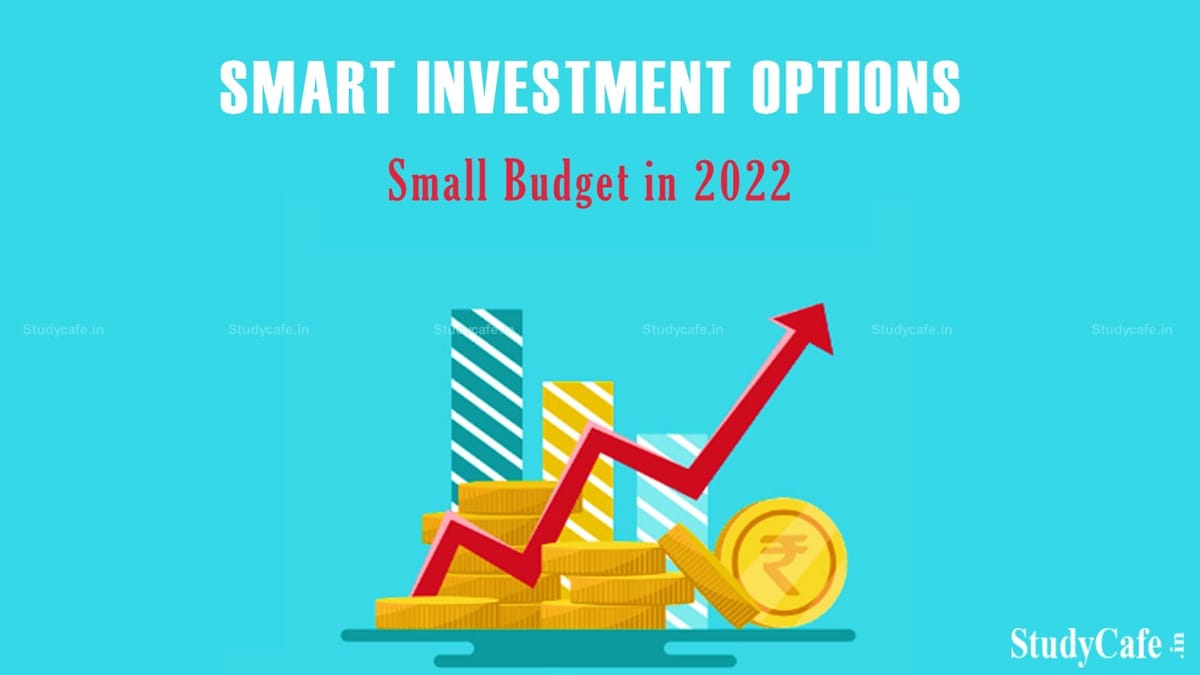Deepshikha | May 23, 2022 |

Smart Investment Options for a Small Budget in 2022
There is a prevalent misunderstanding, especially in the domain of personal finance, that producing money is synonymous with saving money. The more one may accumulate, the more they are creating. Regrettably, this isn’t entirely accurate. While having a large bank account may indicate liquidity, it is also vulnerable to depletion – especially if you have no job security or other sources of income.
However, you don’t have to be a financial genius to spot a good investment opportunity. You also don’t need a large sum of money in your account to invest. Small, but sensible, investments rely on consistency more than lump sums to produce profitable returns. Investing is a terrific, safe (yes, safe!) method to make more money whether you’ve just started your first job or are well into your fifties.
The word “risk” may be frightening, but knowing what it means can help you avoid it as much as possible. To do so, you must first determine your risk profile. In simple words, a person’s risk profile determines how willing they are to accept risks. The risk profile defines how much they can experiment with what and how much they invest in the case of investments.
This “willingness” to take chances isn’t always a personality trait. A risk profile is created based on your age (to determine how long you should invest), financial condition (to determine how much you should invest), and job security (to determine liquidity). A younger person with a stable career, for example, can invest in smaller amounts for a longer period. Someone in their forties, on the other hand, may need to set away money for debt payments, children’s education, and other obligations.
You can then check into smart investment possibilities for your budget once you’ve assessed your risk profile.
If you are unfamiliar with equity investments, mutual funds are a safe way to invest in the stock market. A small- or mid-cap mutual fund is a wonderful place to start while you learn more about the market and how to make your own investment decisions in specific firms.
The benefit of investing in a mutual fund is that it diversifies your stock portfolio. If you’re a newbie investor, a SIP (systematic investment plan) is recommended to equal out your dividends and yields across market volatility.
The government has created numerous investment opportunities. some of these are funds that you might already be investing in, through your employer. The PPF is one of the most well-known (Public Provident Fund). The NPS (National Pension Scheme) and the NCS (National Contribution Scheme) are two further choices (National Savings Certificate).
These are perfect if you have a small investment contribution and want to save for retirement.
In India, gold is a popular investment option. However, you no longer need to purchase jewels and coins or locate a storage locker. You could instead invest in gold bonds. Gold bonds are far more secure because they do not require the purchase of physical metal or any metalworker fees.
Furthermore, unlike genuine gold, gold bonds are GST-free. Gold bonds offer highly excellent interest rates, and they’re all guaranteed by the Indian government, ensuring your investment’s safety.
A High Yield Savings Account (HYSA) is a fantastic way to generate passive income. If you’re saving money in a savings account, do your research to discover one with the lowest fees and highest returns. Savings accounts come with a variety of interest rates, so you should be able to pick one that suits your needs.
While FDs are not recommended for a very young investor, they can be highly useful immediately before you take on other types of obligations. Their interest rates are higher than savings accounts, and they’re a safer way to save money than a high-yield savings account. They are quite simple to use, and many of them provide competitive interest rates! If you’re concerned about liquidity, some banks provide FDs with early withdrawal choices.
At the end of the day, you must decide what to invest in. Just keep in mind that before making any investment, you should think about your bills, retirement plans, and emergency cash. More importantly, make sure your investments are well-diversified so you don’t lose money if one area suffers a setback.
In case of any Doubt regarding Membership you can mail us at [email protected]
Join Studycafe's WhatsApp Group or Telegram Channel for Latest Updates on Government Job, Sarkari Naukri, Private Jobs, Income Tax, GST, Companies Act, Judgements and CA, CS, ICWA, and MUCH MORE!"